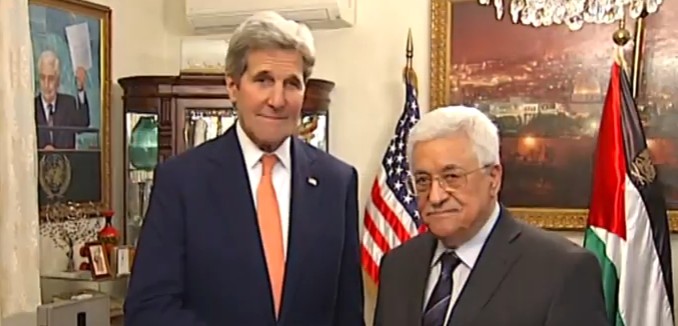On April 22, 2014, only a week before the end of the nine-month negotiating period set by the White House, Israeli negotiators felt that they had made progress in talks with the Palestinians, and came up with a proposal to extend the negotiations. But the following day, Palestinian Authority President Mahmoud Abbas signed a reconciliation deal with Hamas—without informing Israel first—thus bringing about “the collapse of yet another gallant effort at Israeli-Palestinian peace-making,” former negotiator Michael Herzog recounted Monday in The American Interest.
Abbas also signed 15 international conventions, prompting Herzog to comment, “Notwithstanding the comic relief of watching the PA asking to join the anti-corruption convention, the Palestinians evaded our questions as to why they had never enacted legislation to address any of the noble goals covered by the conventions.”
Herzog is not the first to make this charge: negotiator and former foreign minister Tzipi Livni similarly claimed in December 2014 that Abbas was at fault for torpedoing talks by making a deal with Hamas and signing the conventions. But Herzog’s account of what occurred during those nine months provide a more comprehensive understanding of what went wrong.
While Herzog called then-Secretary of State John Kerry “indefatigable” and praised him “for his commitment, determination, and intelligence, and for his indispensable role in propelling the process,” he also was unsparing in his criticisms of Kerry’s mistakes in shepherding the negotiations along.
Herzog faulted Kerry for demanding that a deal be reached in nine months, which “was clearly unrealistic, given the very significant gaps and mistrust between the parties.” Herzog also questioned Kerry’s insistence that both parties talk directly to him rather than to each other, which gave rise to a number of misunderstandings.
Still, Herzog stated, Israelis and Palestinians, rather than the U.S., should shoulder most of the blame. “After all,” he wrote, “it is they who own the conflict; it is they who must live with its consequences. Any failure in a peace process is first and foremost their failure.”
Herzog criticized Israeli Prime Minister Benjamin Netanyahu’s choice to release convicted terrorists rather than impose “meaningful restraint—’a major slowdown’ in Kerry’s language—of settlement activity in the West Bank” in order to keep the process going. Nonetheless, the former negotiator described Netanyahu as “immersed in the process” and praised him for his “seriousness, far more so than public accounts attest” in trying to get an agreement.
On the other hand, Palestinian negotiator Saeb Erekat allegedly complained that nine months was too long of a time to negotiate; “his statement succinctly reflects the Palestinian mindset I have witnessed for years,” Herzog wrote. He also had a critical assessment of Palestinian Authority President Mahmoud Abbas:
Much as many ask whether Netanyahu possesses the will or the capacity to make the bold decisions necessary for peace, I have serious doubts about Abbas. They are supported by his record (including the way he avoided responding to Olmert’s offer in 2008) and his demeanor. Aging, losing domestic legitimacy and focused on his legacy, he is even less prone to taking such risks.
Herzog offered three suggestions for the future. Firstly, while a comprehensive agreement isn’t possible in the short term, that doesn’t mean that the parties shouldn’t attempt to find common ground and build from there. Additionally, negotiations should not be dependent on a single issue, as the situation is a “complex, multi-dimensional challenge with interconnected components, and should be addressed as such. Finally, despite the fact that Israel is “lacking a willing and capable Palestinian partner, it should nevertheless seek regional and international partners (which it is likely to find), and apply some constructive unilateral measures in coordination with these partners (including ceasing settlement activity beyond the blocs)—all the while leaving the door open to a future negotiated settlement.”
[Photo: President Abbas / YouTube ]




